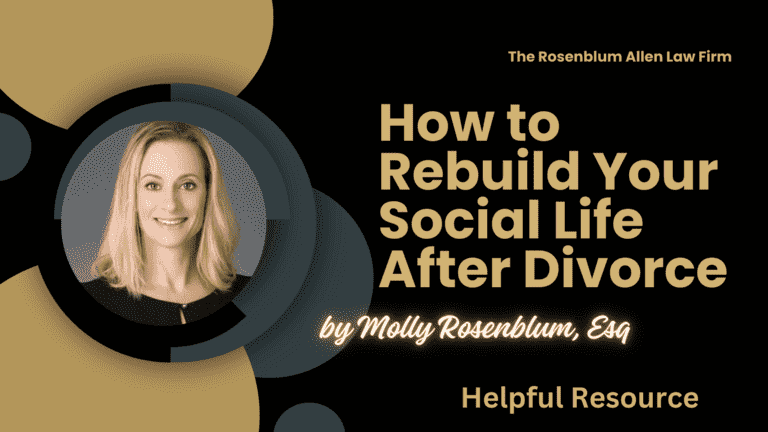
Understanding the Emotional Impact of Divorce
Processing Grief and Loss
Divorce is more than just a legal process; it’s an emotional rollercoaster. It’s normal to feel a mix of sadness, anger, relief, and confusion. Here’s how to navigate these feelings:- Acknowledge your emotions: It’s okay to feel sad or angry. Recognize these feelings without judgment.
- Give yourself time: Healing doesn’t happen overnight. Allow yourself to grieve at your own pace.
Dealing with Loneliness and Isolation
Feeling lonely is common post-divorce, but it’s important to tackle this head-on:- Stay connected: Reach out to friends and family, even just a quick chat.
- Join groups: Whether online or in-person, connecting with others in similar situations can be comforting.
The Role of Self-Care in Emotional Recovery
Taking care of yourself is crucial during this time:- Stay active: Exercise can boost your mood and energy levels.
- Eat well: Good nutrition helps your body and mind.
- Get enough sleep: Proper rest is essential for emotional well-being.
Creating a Supportive Network
Building a solid support system is critical to rebuilding your social life:Importance of Support Groups and Therapy
- Support groups: Joining a divorce support group in Nevada can provide comfort and advice from those who understand your situation.
- Therapy: Professional guidance can help you process your feelings and start rebuilding.
Leveraging Existing Relationships with Friends and Family
- Reconnect with old friends: Sometimes, we lose touch with friends during marriage. This is a great time to reconnect.
- Family ties: Lean on your family for support. They can offer a listening ear and a comforting presence.
Making New Connections Through Community Activities
- Local events: Check out community events in Nevada where you can meet new people.
- Hobby groups: Whether hiking, reading, or painting, joining a group that shares your interests can be a great way to make friends.

Balancing Independence and Socializing
After a divorce, finding the right balance between enjoying your independence and engaging in social activities is critical.
Importance of Spending Time Alone
- Self-discovery: Use this time to learn more about yourself and what makes you happy.
- Healing process: Solitude can be healing, allowing you to process your emotions in a safe space.
Finding the Right Balance Between Solitude and Social Activities
- Schedule time for yourself: Just like you plan social activities, set aside time for yourself.
- Listen to your needs: Some days, you feel like being around others, and sometimes you prefer solitude. Both are okay.
Embracing Independence While Staying Connected
- New skills: Learn something new that you can do independently, like cooking a dish or gardening.
- Stay in touch: Regularly check in with friends and family, even just phone calls or texts.

Legal Considerations in Nevada
Understanding the legal aspects of post-divorce life in Nevada is essential, especially when it involves social interactions.
Understanding Legal Implications on Social Life Post-Divorce
- Know the limits: If your divorce decree includes specific clauses about conduct or interactions, understand and follow them.
Child Custody and Co-parenting Dynamics
- Co-parenting: Work towards a healthy co-parenting relationship for the benefit of your children.
- Children’s social lives: Be mindful of how your social life affects your children, especially when introducing them to new people.
Financial Independence and Its Impact on Social Activities
- Budgeting for social activities: Be mindful of your financial changes post-divorce and plan social activities accordingly.
- Financial independence: Use this time to understand and take charge of your finances, which can boost your confidence.

Breaking It All Down for You
Rebuilding your social life after a divorce in Nevada can be a journey filled with self-discovery, new connections, and personal growth. Remember, each person’s journey is unique, so take it at your own pace. Embrace your newfound independence, explore new interests, and connect with others when you’re ready. You’re not just rebuilding your social life; you’re creating a new, fulfilling chapter in your story.

Frequently Asked Questions
What are some specific support groups in Nevada for people going through a divorce?
Various support groups are available in Nevada, including local community groups and online forums. Organizations like DivorceCare often have local meeting listings, and local community centers or religious organizations might also host groups.
How can I manage my time effectively between my children, work, and social life post-divorce?
Creating a balanced schedule is critical. Prioritize your commitments and set aside specific times for your children, work, and social activities. Using a planner or digital calendar can help you manage your time effectively.
Are there any specific online platforms recommended for meeting new people in Nevada?
Aside from general platforms like Meetup and Facebook groups, local Nevada community websites and forums can be great for finding events and groups. Apps like Nextdoor can also connect you with neighbors and local activities.
How do I deal with adverse reactions from my social circle regarding my divorce?
It’s essential to surround yourself with supportive people. If you encounter negativity, calmly explain your situation and need for support. If the adverse reactions continue, it may be healthier to distance yourself from those individuals.
Can engaging in community service help me rebuild my social life?
Absolutely! Volunteering for community service helps you meet people with similar interests and provides a sense of fulfillment and purpose.
What are some child-friendly activities in Nevada where I can meet other single parents?
Nevada offers many child-friendly activities, including parks, museums, and community events. Look for local parent groups, school events, or children’s sports leagues where you can connect with other single parents.
How do I handle jealousy or discomfort when seeing my ex-spouse with new partners at social events?
It’s natural to feel uncomfortable in such situations. Focus on your well-being and the people you’re with. Excuse yourself from the situation to gather your thoughts and emotions if necessary.
How can I help my children adjust to my new social life after the divorce?
Open communication is critical. Talk to your children about how life changes and involve them. Ensure they feel secure and know they are a priority in your life.
Are specific hobbies or activities more conducive to meeting people in Nevada?
Outdoor activities like hiking, group sports, or joining fitness clubs can be particularly conducive to meeting people in Nevada due to its scenic landscapes and active community. Art classes, cooking workshops, or book clubs are also great options.
What should I consider before introducing someone I'm dating to my children?
Consider the seriousness and stability of the relationship first. It’s vital to ensure that the person will be a positive influence and that introducing them to your children is in everyone’s best interest.
Additional Resources for You

Our lead attorney, Molly Rosenblum Allen, Esq., has not only provided expert legal representation but has also created a comprehensive suite of resources to assist you during challenging times. These resources are designed to offer guidance and support in various aspects related to divorce. Here are the invaluable resources available at your disposal:
Las Vegas Divorce Attorney: An in-depth guide offering crucial information and assistance for those navigating a divorce in Las Vegas. Available at Rosenblum Law Las Vegas Divorce Attorney.
How to Cope with Divorce: A comprehensive resource providing strategies and advice on managing the emotional impact of a divorce. Visit Rosenblum Law How to Cope with Divorce for more details.
Social Media and Divorce: Insightful guidance on the implications of social media use during a divorce process. Learn more at Rosenblum Law Social Media and Divorce.
Moving On After Divorce from a Narcissist: Expert advice for rebuilding your life after ending a relationship with a narcissistic partner. Available at Rosenblum Law Moving On After Divorce from a Narcissist.
Divorce Effects on Children’s Education: A focused look at how divorce can impact the educational journey of children and how to mitigate these effects. Read more at Rosenblum Law Divorce Effects on Children’s Education.
Introducing New Partner to Child After Divorce: Guidance on navigating the sensitive process of introducing a new partner to your child post-divorce. Find out more at Rosenblum Law Introducing New Partner to Child After Divorce.
Child Therapy and Divorce: Insights into the importance of child therapy during and after the divorce process. Available at Rosenblum Law Child Therapy and Divorce.
Signs Your Child is Struggling with Your Divorce: Key indicators to watch for if you’re concerned about how your child is coping with your divorce. Available at Rosenblum Law Signs Your Child is Struggling with Your Divorce.
Top Tips For Parenting Through Divorce: A collection of practical and compassionate advice for effectively parenting through the challenges of a divorce. Visit Rosenblum Law Top Tips For Parenting Through Divorce for more information.
Managing Stress and Emotions During Divorce: Guidance on maintaining your emotional and mental well-being while navigating a divorce. Read more at Rosenblum Law Managing Stress and Emotions During Divorce.
Molly Rosenblum Allen, Esq. is dedicated to providing not only legal support but also the resources necessary to navigate the complex emotional and practical aspects of divorce, ensuring that you and your loved ones have the tools needed for a smoother transition during this challenging time.

Offsite Resources You May Find Helpful
He are several offsite resources that could be highly beneficial to readers seeking additional information and support related to divorce, rebuilding social life, and legal aspects in Nevada:
Psychology Today: A comprehensive resource offering articles, therapist directories, and insights into various aspects of mental health, including coping with divorce. Visit Psychology Today
Meetup: An excellent platform to find and join local groups and activities based on your interests, which can be a great way to rebuild your social circle post-divorce. Visit Meetup
- VolunteerMatch: A platform to find volunteer opportunities, which can be a fulfilling way to meet new people and engage in community service. Visit VolunteerMatch
- Eventbrite: Discover local events and activities in Nevada, which can be a great way to socialize and meet new people. Visit Eventbrite
Parents Without Partners: An international organization dedicated to the welfare and interests of single parents and their children, offering support and networking opportunities. Visit Parents Without Partners
These resources offer a wide range of support, from legal assistance to social networking and mental health, providing valuable tools for those navigating life after divorce.

A Special Message From Our Lead Attorney
Why You Might Need a Lawyer
Molly Rosenblum, Esq

Dear Reader,
Thank you for taking the time to explore our divorce resources.
I hope you found the information helpful and insightful as you navigate through this challenging phase of your life.
Understanding your needs and concerns is the heart of what we do at The Rosenblum Allen Law Firm.
Please reach out if you feel ready to take the following steps or have any questions about your situation.
My team and I are committed to providing the support and guidance you need during this time.
Call us at (702) 433-2889 to get the ball rolling on your situation.
We are here to listen, understand, and help you through every step of your journey.
Looking forward to hearing from you,
Molly Rosenblum, Esq.




